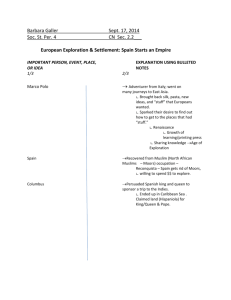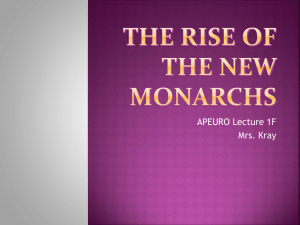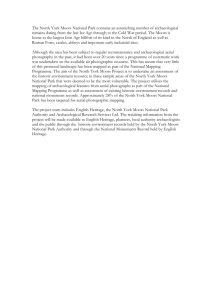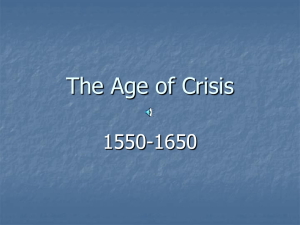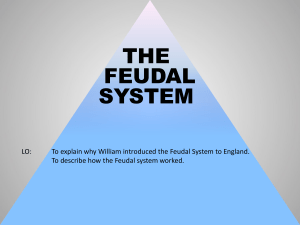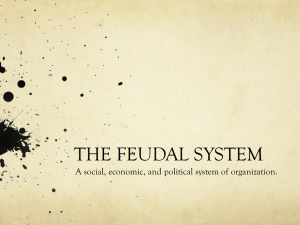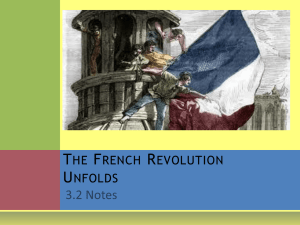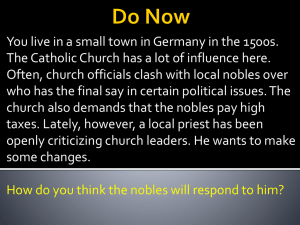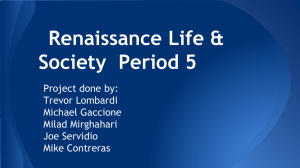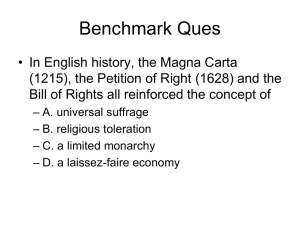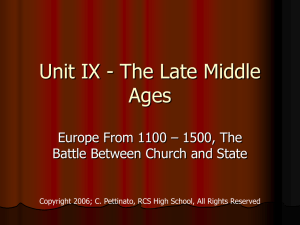(b) - Cloudfront.net
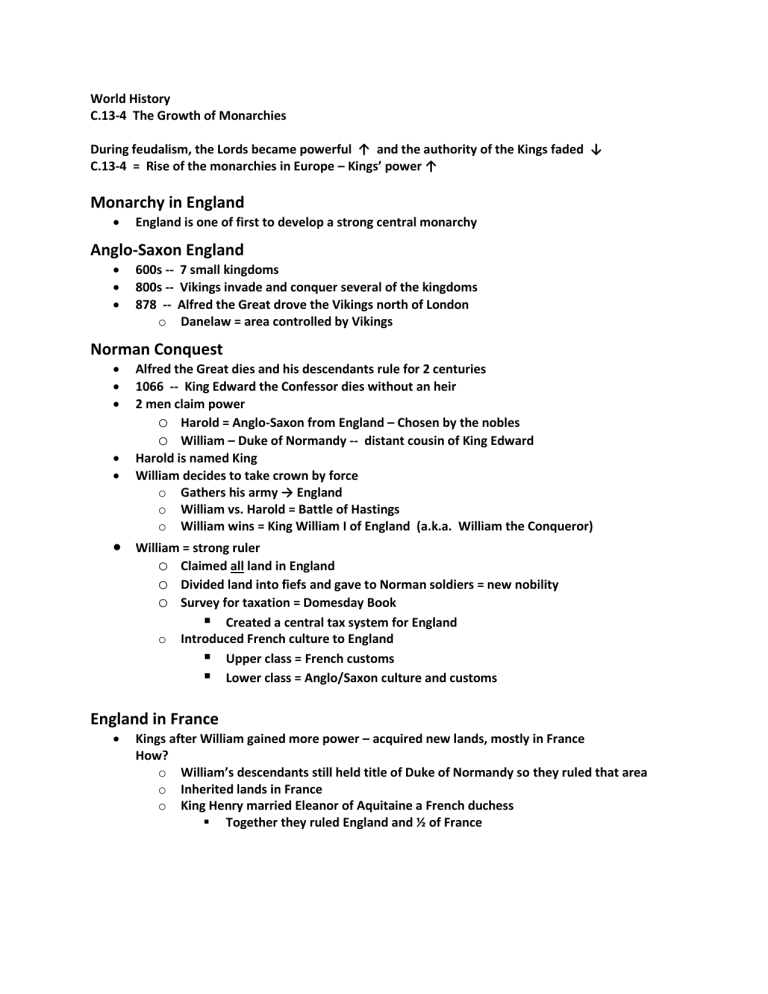
World History
C.13-4 The Growth of Monarchies
During feudalism, the Lords became powerful ↑ and the authority of the Kings faded ↓
C.13-4 = Rise of the monarchies in Europe – Kings’ power ↑
Monarchy in England
England is one of first to develop a strong central monarchy
Anglo-Saxon England
600s -- 7 small kingdoms
800s -- Vikings invade and conquer several of the kingdoms
878 -- Alfred the Great drove the Vikings north of London o Danelaw = area controlled by Vikings
Norman Conquest
Alfred the Great dies and his descendants rule for 2 centuries
1066 -- King Edward the Confessor dies without an heir
2 men claim power o
Harold = Anglo-Saxon from England – Chosen by the nobles o
William – Duke of Normandy -- distant cousin of King Edward
Harold is named King
William decides to take crown by force o Gathers his army → England o William vs. Harold = Battle of Hastings o William wins = King William I of England (a.k.a. William the Conqueror)
William = strong ruler o
Claimed all land in England o
Divided land into fiefs and gave to Norman soldiers = new nobility o
Survey for taxation = Domesday Book
Created a central tax system for England o Introduced French culture to England
Upper class = French customs
Lower class = Anglo/Saxon culture and customs
England in France
Kings after William gained more power – acquired new lands, mostly in France
How? o William’s descendants still held title of Duke of Normandy so they ruled that area o Inherited lands in France o King Henry married Eleanor of Aquitaine a French duchess
Together they ruled England and ½ of France
Magna Carta
o English Kings are strong o Nobles fear they will lose their rights o King John – crisis point o Goes to war with France and loses most of England’s holdings in France o Short of money o Tries to raise $ with new tax on the nobles o Nobles refuse and take up arms against the king o 1215 -- King John forced to sign the Magna Carta o Magna Carta o Outlined the rights of the nobles o Restricted the King’s power
Ex. -- King needs the consent of the nobles to raise taxes
Ex. -- can’t arrest and punish without cause
Ex. -- can’t take property without legal procedures o Important document because it
Limits government and executive power (power of the King)
King is not above the law
1 st important step in the formation of modern democracies o Parliament (governing bodies) o 1260s – another noble rebellion – to end the rebellion, the king agreed to meet with the nobility, clergy and middle class to discuss the issues and the result = parliament o 1295 -- King Edward I clarified the role of Parliament and worked with it
His parliament had representatives from every town in England – not just the nobles and the clergy
Monarchy in France
After Charlemagne o kings of France did not rule much territory – basically just around Paris and Orleans the rest of France was controlled by nobles and King of England o 900s – noble family to power and elected a king = Capetians o King = Hugh Capet -- extended the monarchy in France o 1300s - Capetians ruled most of modern France
Holy Roman Empire
After Charlemagne o empire split into two o West = France o East = Germany
Germany split into small states each ruled by a Duke (Prince) o 936 -- Otto the Great, Duke of Saxony tried to unite the German lands o 962 -- nobles challenge Pope John XII and the Pope turns to Otto for help o Otto helps o Pope rewards Otto by crowning him “Emperor of the Romans”
o Territory unites under Otto = Holy Roman Empire
BUT -- Dukes kept full authority in their lands o Holy Roman Emperors did not inherit the position – they were elected by the important
states and archbishops. o Holy Roman Emperor traveled to Rome to be crowned by the Pope -- Why important?
Spain and Portugal
o Share the Iberian Peninsula o 700s -- Conquered by Muslims – called Moors o Most powerful state = Cordoba o Christians ruled a few small kingdoms in the North o 722 -- Christians tried to drive Moors out of Europe -- little success o 1000s -- Civil war in Muslim Spain weakens the Moors o Christians seize the opportunity with campaigns to retake the Iberian Peninsula =
Reconquista
Leader of the Reconquista = Kingdom of Castile o 1085 -- King of Castile takes Cordoba o Kingdoms of Portugal and Aragon join the effort o 1100 -- Moors out of Portugal o 1236 -- Moors out of most of Spain, only Granada still Muslim o 1492 -- Moors lose Granada, Moors totally out of Spain o 1479 -- Modern Spain -- Marriage of the rulers of Castile and Aragon unite Spain
King Ferdinand and Queen Isabella
